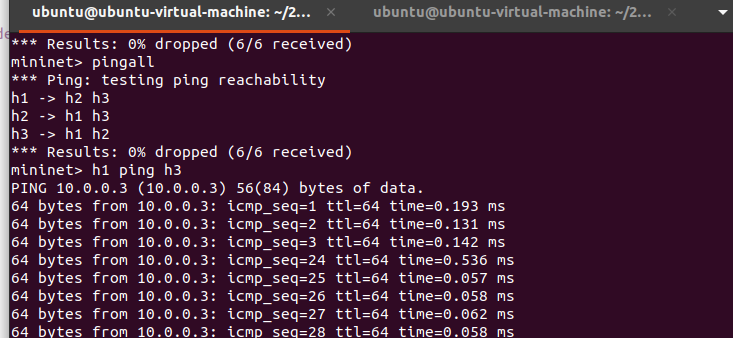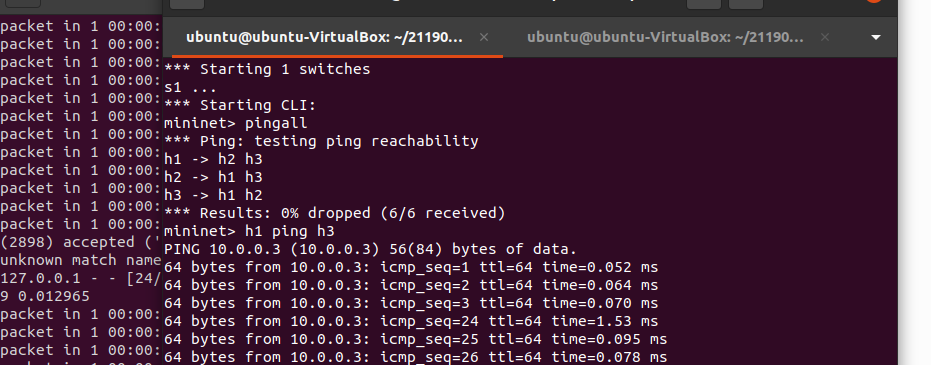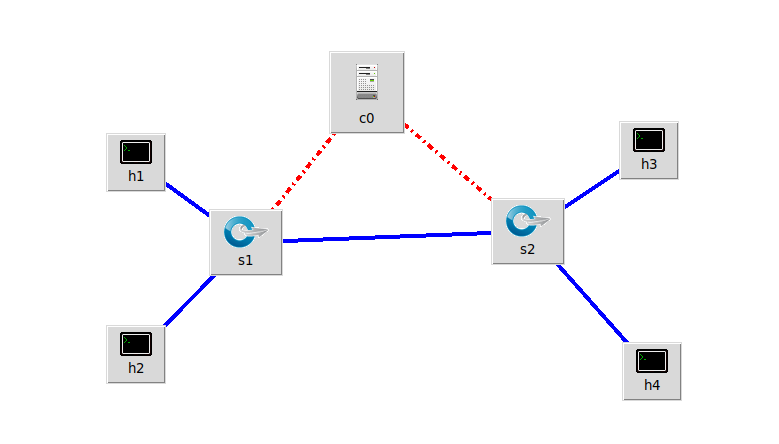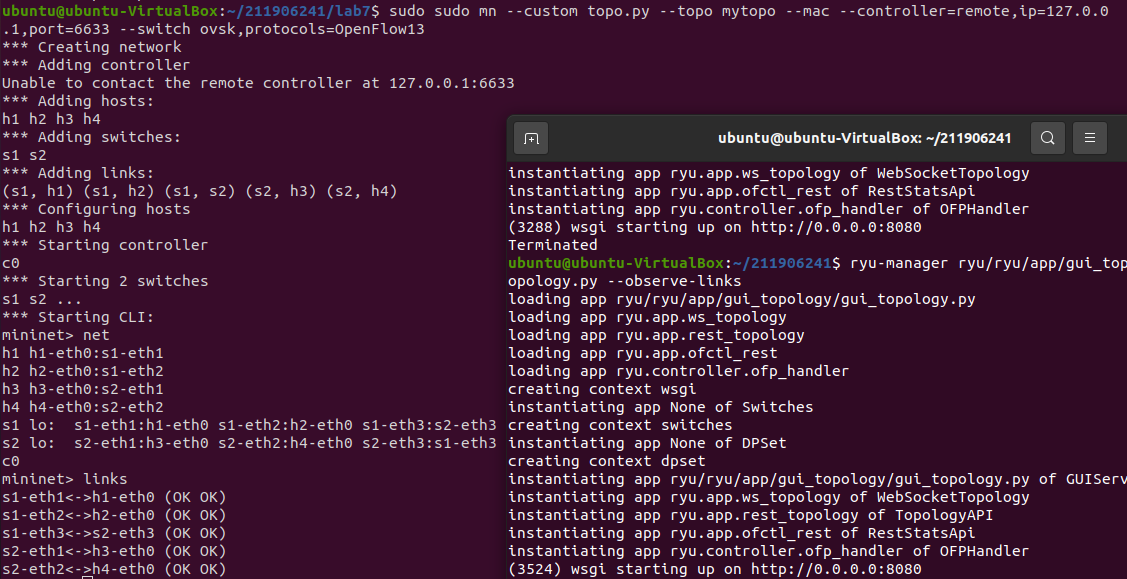SDN第七次上机作业
任务一
编写Python程序,调用OpenDaylight的北向接口下发指令删除s1上的流表数据。
#!/usr/bin/python
import requests
from requests.auth import HTTPBasicAuth
if __name__ == "__main__":
url = 'http://127.0.0.1:8181/restconf/config/opendaylight-inventory:nodes/node/openflow:1/'
headers = {'Content-Type': 'application/json'}
res = requests.delete(url, headers=headers, auth=HTTPBasicAuth('admin', 'admin'))
print (res.content)
![]()
编写Python程序,调用OpenDaylight的北向接口下发硬超时流表,实现拓扑内主机h1和h3网络中断20s。
#!/usr/bin/python
import requests
from requests.auth import HTTPBasicAuth
def http_put(url,jstr):
url= url
headers = {'Content-Type':'application/json'}
resp = requests.put(url,jstr,headers=headers,auth=HTTPBasicAuth('admin', 'admin'))
return resp
if __name__ == "__main__":
url = 'http://127.0.0.1:8181/restconf/config/opendaylight-inventory:nodes/node/openflow:1/'
with open('test1.json') as f:
jstr = f.read()
resp = http_put(url,jstr)
print (resp.content)
![]()
很明显3-24s断了
编写Python程序,调用OpenDaylight的北向接口获取s1上活动的流表数。
#!/usr/bin/python
import requests
from requests.auth import HTTPBasicAuth
if __name__ == "__main__":
url = 'http://127.0.0.1:8181/restconf/operational/opendaylight-inventory:nodes/node/openflow:1/flow-node-inventory:table/0/opendaylight-flow-table-statistics:flow-table-statistics'
headers = {'Content-Type': 'application/json'}
res = requests.get(url,headers=headers, auth=HTTPBasicAuth('admin', 'admin'))
print (res.content)
![]()
任务二
编写Python程序,调用Ryu的北向接口,实现上述OpenDaylight实验拓扑上相同的硬超时流表下发。
python
#!/usr/bin/python
import requests
from requests.auth import HTTPBasicAuth
def http_post(url,jstr):
url= url
headers = {'Content-Type':'application/json'}
resp = requests.post(url,jstr,headers=headers)
return resp
if __name__ == "__main__":
url='http://127.0.0.1:8080/stats/flowentry/add'
requests.adapters.DEFAULT_RETRIES = 5
with open('1.json') as f:
jstr = f.read()
resp = http_post(url,jstr)
print (resp.content)
s = requests.session()
s.keep_alive = False
json
{
"dpid": 1,
"match": {
"in-port": "1",
"dl_dst": "00:00:00:00:00:03"
},
"priority": 65535,
"hard_timeout": 20,
"cookie": "2",
"table_id": 0,
"actions": []
}
![]()
利用Mininet平台搭建下图所示网络拓扑,要求支持OpenFlow 1.3协议,主机名、交换机名以及端口对应正确。拓扑生成后需连接Ryu,且Ryu应能够提供REST API服务
![]()
![]()
整理一个Shell脚本,参考Ryu REST API的文档,利用curl命令,实现和实验2相同的VLAN
curl -X POST -d '{
"dpid": 1,
"priority": 1,
"match":{
"in_port": 1
},
"actions":[
{
"type": "PUSH_VLAN",
"ethertype": 33024
},
{
"type": "SET_FIELD",
"field": "vlan_vid",
"value": 4096
},
{
"type": "OUTPUT",
"port": 3
}
]
}' http://localhost:8080/stats/flowentry/add
curl -X POST -d '{
"dpid": 1,
"priority": 1,
"match":{
"in_port": 2
},
"actions":[
{
"type": "PUSH_VLAN",
"ethertype": 33024
},
{
"type": "SET_FIELD",
"field": "vlan_vid",
"value": 4097
},
{
"type": "OUTPUT",
"port": 3
}
]
}' http://localhost:8080/stats/flowentry/add
curl -X POST -d '{
"dpid": 1,
"priority": 1,
"match":{
"vlan_vid": 0
},
"actions":[
{
"type": "POP_VLAN",
"ethertype": 33024
},
{
"type": "OUTPUT",
"port": 1
}
]
}' http://localhost:8080/stats/flowentry/add
curl -X POST -d '{
"dpid": 1,
"priority": 1,
"match":{
"vlan_vid": 1
},
"actions":[
{
"type": "POP_VLAN",
"ethertype": 33024
},
{
"type": "OUTPUT",
"port": 2
}
]
}' http://localhost:8080/stats/flowentry/add
curl -X POST -d '{
"dpid": 2,
"priority": 1,
"match":{
"in_port": 1
},
"actions":[
{
"type": "PUSH_VLAN",
"ethertype": 33024
},
{
"type": "SET_FIELD",
"field": "vlan_vid",
"value": 4096
},
{
"type": "OUTPUT",
"port": 3
}
]
}' http://localhost:8080/stats/flowentry/add
curl -X POST -d '{
"dpid": 2,
"priority": 1,
"match":{
"in_port": 2
},
"actions":[
{
"type": "PUSH_VLAN",
"ethertype": 33024
},
{
"type": "SET_FIELD",
"field": "vlan_vid",
"value": 4097
},
{
"type": "OUTPUT",
"port": 3
}
]
}' http://localhost:8080/stats/flowentry/add
curl -X POST -d '{
"dpid": 2,
"priority": 1,
"match":{
"vlan_vid": 0
},
"actions":[
{
"type": "POP_VLAN",
"ethertype": 33024
},
{
"type": "OUTPUT",
"port": 1
}
]
}' http://localhost:8080/stats/flowentry/add
curl -X POST -d '{
"dpid": 2,
"priority": 1,
"match":{
"vlan_vid": 1
},
"actions":[
{
"type": "POP_VLAN",
"ethertype": 33024
},
{
"type": "OUTPUT",
"port": 2
}
]
}' http://localhost:8080/stats/flowentry/add
![]()
进阶任务
#!/usr/bin/python
import json
import requests
if __name__ == "__main__":
url = 'http://127.0.0.1:8080/stats/flowentry/add'
headers = {'Content-Type': 'application/json'}
flow1 = {
"dpid": 1,
"priority": 1,
"match":{
"in_port": 1
},
"actions":[
{
"type": "PUSH_VLAN",
"ethertype": 33024
},
{
"type": "SET_FIELD",
"field": "vlan_vid",
"value": 4096
},
{
"type": "OUTPUT",
"port": 3
}
]
}
flow2 = {
"dpid": 1,
"priority": 1,
"match":{
"in_port": 2
},
"actions":[
{
"type": "PUSH_VLAN",
"ethertype": 33024
},
{
"type": "SET_FIELD",
"field": "vlan_vid",
"value": 4097
},
{
"type": "OUTPUT",
"port": 3
}
]
}
flow3 = {
"dpid": 1,
"priority": 1,
"match":{
"vlan_vid": 0
},
"actions":[
{
"type": "POP_VLAN",
"ethertype": 33024
},
{
"type": "OUTPUT",
"port": 1
}
]
}
flow4 = {
"dpid": 1,
"priority": 1,
"match": {
"vlan_vid": 1
},
"actions": [
{
"type": "POP_VLAN", # Push a new VLAN tag if a input frame is non-VLAN-tagged
"ethertype": 33024 # Ethertype 0x8100(=33024): IEEE 802.1Q VLAN-tagged frame
},
{
"type": "OUTPUT",
"port": 2
}
]
}
flow5 = {
"dpid": 2,
"priority": 1,
"match": {
"in_port": 1
},
"actions": [
{
"type": "PUSH_VLAN", # Push a new VLAN tag if a input frame is non-VLAN-tagged
"ethertype": 33024 # Ethertype 0x8100(=33024): IEEE 802.1Q VLAN-tagged frame
},
{
"type": "SET_FIELD",
"field": "vlan_vid", # Set VLAN ID
"value": 4096 # Describe sum of vlan_id(e.g. 6) | OFPVID_PRESENT(0x1000=4096)
},
{
"type": "OUTPUT",
"port": 3
}
]
}
flow6 = {
"dpid": 2,
"priority": 1,
"match": {
"in_port": 2
},
"actions": [
{
"type": "PUSH_VLAN", # Push a new VLAN tag if a input frame is non-VLAN-tagged
"ethertype": 33024 # Ethertype 0x8100(=33024): IEEE 802.1Q VLAN-tagged frame
},
{
"type": "SET_FIELD",
"field": "vlan_vid", # Set VLAN ID
"value": 4097 # Describe sum of vlan_id(e.g. 6) | OFPVID_PRESENT(0x1000=4096)
},
{
"type": "OUTPUT",
"port": 3
}
]
}
flow7 = {
"dpid": 2,
"priority": 1,
"match": {
"vlan_vid": 0
},
"actions": [
{
"type": "POP_VLAN", # Push a new VLAN tag if a input frame is non-VLAN-tagged
"ethertype": 33024 # Ethertype 0x8100(=33024): IEEE 802.1Q VLAN-tagged frame
},
{
"type": "OUTPUT",
"port": 1
}
]
}
flow8 = {
"dpid": 2,
"priority": 1,
"match": {
"vlan_vid": 0
},
"actions": [
{
"type": "POP_VLAN", # Push a new VLAN tag if a input frame is non-VLAN-tagged
"ethertype": 33024 # Ethertype 0x8100(=33024): IEEE 802.1Q VLAN-tagged frame
},
{
"type": "OUTPUT",
"port": 1
}
]
}
res1 = requests.post(url, json=flow1)
res2 = requests.post(url, json=flow2)
res3 = requests.post(url, json=flow3)
res4 = requests.post(url, json=flow4)
res5 = requests.post(url, json=flow5)
res6 = requests.post(url, json=flow6)
res7 = requests.post(url, json=flow7)
res8 = requests.post(url, json=flow8)
![]()
个人总结
这次实验一开始差点把我心态搞崩,每次使用python命令就会出一大堆的error,幸好在同学的帮助下解决了,这种报错其实就是代码里面缩进和连接符错误导致的,运行成功的代码就会显示b''。在解决了这个问题之后其实都就能很快做完ODL部分。ryu部分每次执行python命令,都会报错Traceback (most recent call last):等一长串莫名其妙的问题,这边要在连接ryu的时候使用ryu-manager ryu.app.simple_switch_13 ryu.app.ofctl_rest ,这样就可以解决问题。细节,细节很重要。虚拟机神一下鬼一下的,属于是很搞人心态了。进阶部分参考了大佬的方法,包括解决那个Traceback (most recent call last):的问题也是在他那边找到的答案,https://www.cnblogs.com/ExcaliburMorgan/p/15426574.html 。


![]()









 浙公网安备 33010602011771号
浙公网安备 33010602011771号